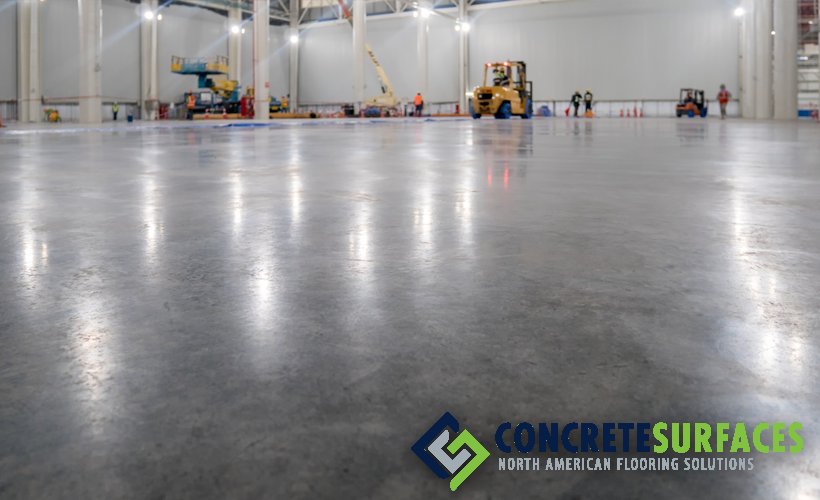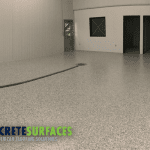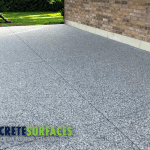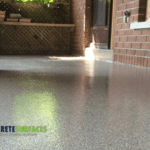If you are looking for a flooring material that is both durable and visually appealing, then epoxy resin is the way to go. However, no flooring is ever unbreakable, and understanding epoxy strength is crucial if you want to store heavy objects in industrial buildings with heavy traffic.
In this article, we will take a deeper dive into this topic to help you understand epoxy flooring durability. Let’s get started!
What Is Epoxy Resin, Anyway?
Epoxy resin is a durable material that can be applied to plywood, tile, and concrete surfaces.
During the installation process, a hardener is added to the epoxy, along with other additives, such as aggregates. It is then applied to the surface and allowed to cure.
The result is a high-strength flooring that is usually preferred over other types because it is anti-slip, resistant to cracks and damage, and long-lasting.
Why Do You Need to Know Epoxy’s Strength?
At this point, you may be wondering why you would need to measure the strength of this resin material. Well, whether you are a epoxy flooring contractor, businessman, or homeowner, understanding the limitations of your epoxy floor can ensure its longevity.
Moreover, being able to calculate the strength of the flooring material before commencing a project can be crucial because it can help you determine whether it will be suitable for the intended traffic load and heavy machinery.
Suppose you know that the flooring will be subjected to heavy loads, for example. In that case, understanding the flexural and compressive strengths will tell you whether it can bend or be exposed to the required pressure.
It’s important to remember that the strength of epoxy is affected by a number of factors, such as:
- The type of epoxy resin used,
- Curing conditions,
- The hardener ratio, and
- Surface preparation.
Measuring Epoxy Strength
The truth is that epoxy strength isn’t as straightforward as one might think. There are several different values that can be used to tell us different things about the material’s ability to resist damage.
Tensile Strength
Tensile strength measures the amount of pulling force the material can withstand before it is damaged. The unit of measurement used to express epoxy resin’s tensile strength is pounds per square inch (PSI).
This value is essential because the natural shifting of concrete surfaces can expose epoxy to pulling forces. Flooring with a high tensile strength is able to withstand stress without breaking.
Flexural Strength
In addition to natural shifting, epoxy flooring can also be subjected to heavy loads, which causes flexing. To ensure that your epoxy resin can withstand this flexing without cracking, you will need to determine its flexural strength.
This is a particularly useful figure to know if the area requires the use of heavy machinery or will be subjected to uneven loads. Knowing the flexural strength can help you protect your floors against excessive loads.
To determine this type of strength, force is applied to the center of a test sample, and the amount of pressure required for it to bend is noted.
Peel Strength
To form a strong and durable flooring solution, epoxy resin must bond to the surface. The peel strength, also measured in pounds per inch (PSI), is intended to help you understand the strength of this bond.
This has a lot to do with surface preparation, as smoother (or unprepared) concrete will have less grip than rougher textures. Other factors that influence peel strength are as follows:
- Epoxy mixing
- Curing
To measure the peel strength, the force required to remove epoxy from the surface is tested.
Compressive Strength
Epoxy resin flooring is often exposed to intense pressure from heavy loads. To determine whether your high-strength epoxy can withstand the pressure, you will need to calculate the compressive strength.
If you don’t want your flooring to sink, you must ensure that your epoxy has a good compressive strength.
To arrive at this figure, a cylinder of epoxy is placed between two plates and compressed until it breaks. The force applied at the breaking point is then noted.
How to Maximize Epoxy Strength for Your Next Flooring Project
Now that you understand how epoxy strength is measured, let’s talk about how you can ensure that your flooring is strong and durable.
Be Wary of Climate Conditions
During the installation process, it’s important to ensure proper climate control. That’s because humidity and temperature changes can affect epoxy’s curing process, reducing its strength.
If humidity is a particularly worrisome pain point, then you may have to consider using water-tolerant primers.
Get the Surface Preparation Right
As we have seen already, proper surface preparation is crucial for the longevity of epoxy resin. Rough or well-prepared concrete has more surface area, ensuring a stronger bond with the epoxy resin.
Sand or diamond blasting is often used to ensure proper adhesion. In addition to creating a rough texture, it’s also important to ensure that the surface is free of dirt, debris, and more for proper surface preparation.
Test Performance
Conducting tests throughout the installation process can also help you maximize epoxy strength. There are testing kits that you can use to determine the moisture content in the concrete that could potentially affect bonding.
This is crucial as it allows you to take proactive measures to prevent issues such as cracking, peeling, or bubbling.
Consider Professional Epoxy Resin Installation
If you lack the knowledge and expertise, it’s always advisable to consult a professional technician for your epoxy flooring project. That’s because a flooring contractor will know how to select an appropriate epoxy resin flooring system to withstand the anticipated pressures.
Need to Install High-strength Epoxy Flooring? Contact Canadian Concrete Surfaces!
Epoxy flooring is renowned for its strength and aesthetic qualities. However, no material is invincible, which is why understanding epoxy flooring durability is critical.
The reality is that calculating epoxy strength and identifying the best flooring system for each project is no easy task.
Fortunately, Canadian Concrete Surfaces can help. Installing durable epoxy for indoor grow facilities, or commercial warehouse flooring, and more is what we do best.
If you’re looking for lifetime durability and epoxy resin that is able to withstand the pressures of daily work use, get in touch with us!
We have the experience to handle and install high-strength epoxy flooring for industrial applications, there’s nothing we can’t help with.

Devon has over 25 years of experience providing customers with high performance epoxy flooring to fit any need or budget. Referrals are our best friend and customer satisfaction is always our top priority. When Devon is not working you can find him fishing, or hunting across North America.







Share This Article
Choose Your Platform: Facebook Twitter Google Plus Linkedin